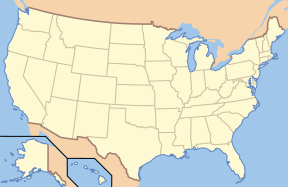{{Superimpose/doc}} is a utility which superimposes one image over another, and positions it relative to the top left corner of the bottom image. Although the original idea was to place a dot on a locator map based on editable coordinates, it can be used to precisely overlay any two images for any reason.
| 此頁面是Template:Superimpose的模板文件。 此頁面可能包含了模板的使用說明、分類和其他內容。 |
Usage
{{Superimpose
| base = US_Locator_Blank.svg
| base_width = 288px
| base_alt = Located in north central Colorado, which in turn is just west of the center of the U.S.
| base_caption = United States Locator Map
| float = Red Dot.svg
| float_width = 10px
| x = 95
| y = 80
}}
To get started, you can simply copy this blank definition into your page, and fill in the data.
{{Superimpose
| base =
| base_width =
| base_alt =
| base_caption =
| float =
| float_width =
| x =
| y =
}}
The following blank definition includes all the parameters, including those less-commonly used.
{{Superimpose
| base =
| base_width =
| base_alt =
| base_caption =
| base_link =
| float =
| float_alt =
| float_width =
| float_caption =
| float_link =
| x =
| y =
}}
- base: File name of the base (bottom) image
- base_width: Width to display the base image, in pixels
- base_alt: Alt text for the image, for visually impaired readers; see Wikipedia:Alternative text for images. This normally describes the combination of the two images.
- base_caption: Text to show when a user's mouse hovers over the base image; ignored if base_link is specified to be empty
- base_link: Name of page that the user should be sent to if they click on the base image. The special value "
file:", stands for the file page for the base image. If empty, nothing happens if the user clicks on the base image. The default is "file:". - float: File name of the top image
- float_width: Width to display the top image, in pixels
- float_alt: Alt text for the top image. This is needed only if float_link is nonempty. Normally the alt text for the base image describes the combination of the two images, and this parameter is not needed.
- float_caption: Text to show when a user's mouse hovers over the top image; ignored if float_link is missing or empty
- float_link: Name of page that the user should be sent to if they click on the top image. This acts like base_link, except it is for the top image, and it defaults to empty.
- x: distance to offset the top image from the left edge of the base image, in pixels or any other CSS-standard units
- y: distance to offset the top image from the top edge of the base image, in pixels or any other CSS-standard units
I originally built this template thinking I could use an SVG file with transparency (mostly for the dot in locator maps). However, it seems Internet Explorer users can't handle transparent PNGs without a fix that Wikimedia's not yet delivering, so for now I recommend using the GIF version in the example above. When IE better supports PNGs, we can swap the better format back in. —Papayoung ☯ 02:06, 26 October 2005 (UTC)
追蹤分類
參見
- {{Superimpose2}}, supports more layer superimposition.
- {{Location map}}, places a single image over another at a map coordinate location
- {{Lageplan}}, related template to Location map with specific features
Wikiwand in your browser!
Seamless Wikipedia browsing. On steroids.
Every time you click a link to Wikipedia, Wiktionary or Wikiquote in your browser's search results, it will show the modern Wikiwand interface.
Wikiwand extension is a five stars, simple, with minimum permission required to keep your browsing private, safe and transparent.
